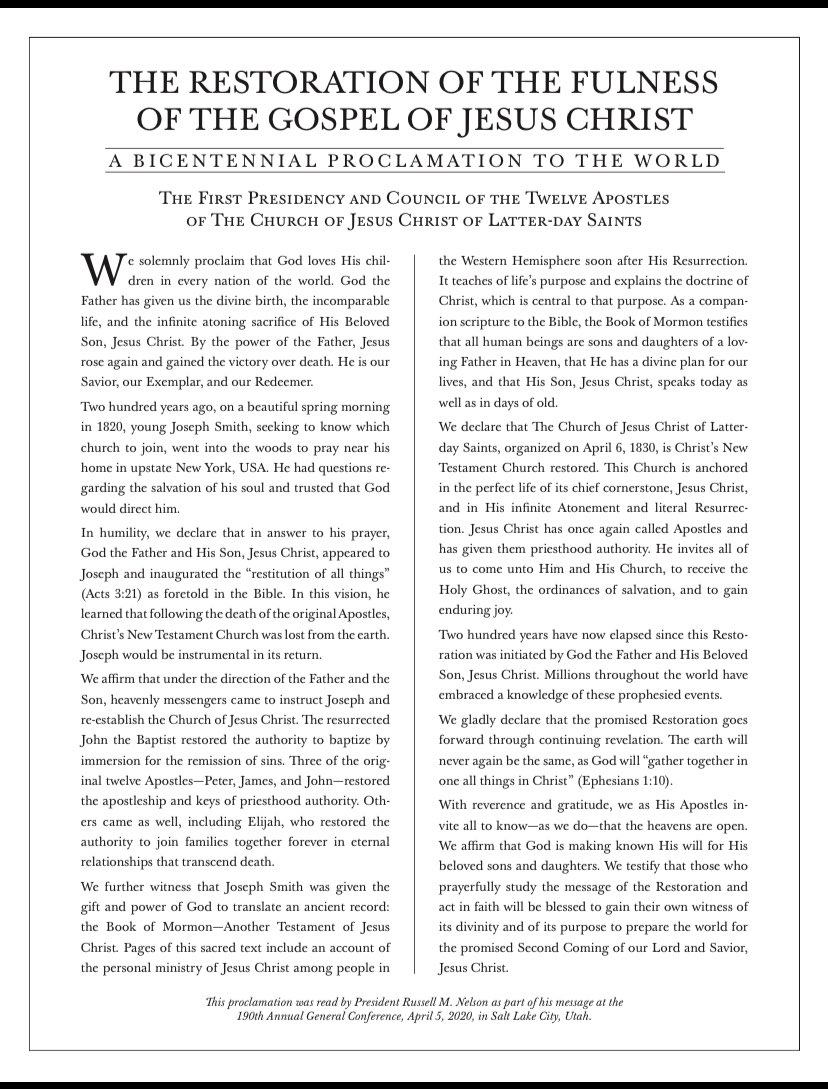Let me preface this by saying I don’t think I’ve met any of the main participants in any of the councils, and I am certainly not familiar in the least with the daily walk of anyone involved. I do not have knowledge of the facts of the case before the various councils. With that in mind I write these hypothetical questions, which probably do not resemble the facts of the case.
1. Suppose a shape-shifting extraterrestrial imitates my form and proceeds to engage in all manner of debauchery in my name. This debauchery is observed by 2 women in my fellowship and as I kneel to bless the sacrament with my fellowship, these two women intervene and say they are not comfortable with me blessing the sacrament and proceed to explain what they have witnessed. Other priesthood holders with valid certificates are present at the meeting. What should I do? Should I, having a valid priesthood certificate signed by 7 women in my fellowship including my wife, assert my rights and continue to bless the sacrament despite their objections? Y N
2. Suppose instead of two women being witnesses, the shape-shifting extraterrestrial’s debauchery in my name is recorded on video for the whole world to see. A women’s council is convened, and it is unanimously decided that my priesthood certificate should be removed. I know I am innocent of the charges, but I cannot convince others that I am. What should I do? Should I continue to argue for my innocence and my right to perform ordinances? Y N
3. Now let’s change the previous example such that in the women’s council 9 of the 12 women are very good at receiving revelation and they receive the knowledge that it was an imposter doing these things in my name – the women’s council correctly rules that I am not guilty. However, 3 of the women do not receive the revelation and, having seen the video, they are visibly uncomfortable in their body language with me performing ordinances, but they aren’t making any verbal objections, wanting to keep peace and respect the outcome of the council. Other priesthood holders with valid certificates are present at the meeting. What should I do? Should I bless the sacrament? Y N
4. Does your answer to the previous question change if the 3 women are vocal in their objections? Y N
5. Same as previous example, but 12 of 12 women in the council receive the revelation that I am innocent. However, 2 good men who have valid priesthood certificates are present in the fellowship meeting have not received the revelation and, having seen the video, they are visibly uncomfortable in their body language with me performing ordinances, but they aren’t making any verbal objections, wanting to keep peace and respect the outcome of the council. What should I do? Does the answer change if the ones uncomfortable are men? Should I bless the sacrament? Y N
Moving on from extraterrestrial shapeshifters…
6. Consider an instance in which a women’s council exercises unrighteous dominion: Suppose that 12 women in my fellowship observe me wearing a New York Yankees cap. There is no scriptural commandment restricting this type of belief, but they decide unanimously that since their favorite blogger roots for Boston, my priesthood certificate should be removed. My wife was out of the country for business during the council and did not participate. I plead my case and appeal to scriptures and note that the blogger has never cast aspersions on the worthiness of Yankee fans, but they are adamant: no worthy priesthood holder can root for the Yankees. They cannot listen to persuasion. What should I do? Should I baptize a fellowship member despite their unrighteous objections? Y N
7. Can I tell my friend “How about, just for today, we form a fellowship consisting of me, you, and our wives, the ladies sign a certificate for me, and I go baptize you?” Y N
8. Should I call up the blogger to voice my objections and ask him to persuade the 12 women to change their mind, or remove them from the covenant body if they persist in this unrighteousness dominion? Y N
9. If the blogger blocked my number years ago after I incessantly called him at 3am to ask him to give a celebrity endorsement to my new brand of bedding called "Second Comforters," should I call up the blogger's wife instead to voice my objections and ask her to settle the matter? Y N
 10. Suppose that a women’s council consisting of 12 covenant-taking women who I have never met from a fellowship I do not belong to call themselves “the ninth circuit women’s council” and, having seen 365 photos from 365 consecutive days of me walking my dog while wearing a Yankees cap, unanimously request that I give surrender my priesthood certificate to them. Should I baptize a fellowship member despite their unrighteous objections? Y N
10. Suppose that a women’s council consisting of 12 covenant-taking women who I have never met from a fellowship I do not belong to call themselves “the ninth circuit women’s council” and, having seen 365 photos from 365 consecutive days of me walking my dog while wearing a Yankees cap, unanimously request that I give surrender my priesthood certificate to them. Should I baptize a fellowship member despite their unrighteous objections? Y N
In all the above examples, the stakes are low, as “Aaronic priesthood is durable” and the ordinances seem to be valid regardless of the worthiness of the priesthood holder.
11. Now let’s raise the stakes a bit – suppose that as a condition of for the return of Zion, some sort of prayer must be performed to invite Enoch and his friends to return. And suppose that this prayer requires at least 8 couples to arrange themselves in a prayer circle, and it is well known that for this order of prayer to be effective, all the individuals in the circle must have the best of feelings toward each other. On this blessed day, my wife and I and 8 couples are invited to perform the ceremony, so it is possible to lose one couple and still complete the invitation. Many decades ago, I had treated one woman in the circle (not my wife) very cruelly when we were both young children. I feel awful about what I had done as a young boy, and while I have apologized profusely many times, I can tell that the woman has just never been comfortable around me—she still, after so many years, can be cordial with me but will never look me in the eyes. Everyone present has been waiting and working for over ten years (and possibly ten million years) for this moment, but one of us has to step out of the circle to send out the invitation. Should I step out of the circle instead of trying to convince her that she should leave? After all, she’s the one with the bad feelings. Y N
12. If your answer to the previous question was N: My efforts to persuade her to leave the circle were not persuasive enough. I could leave the circle, or try to persuade the other couples to ask her to leave. Should I leave the circle? Y N

.png)









